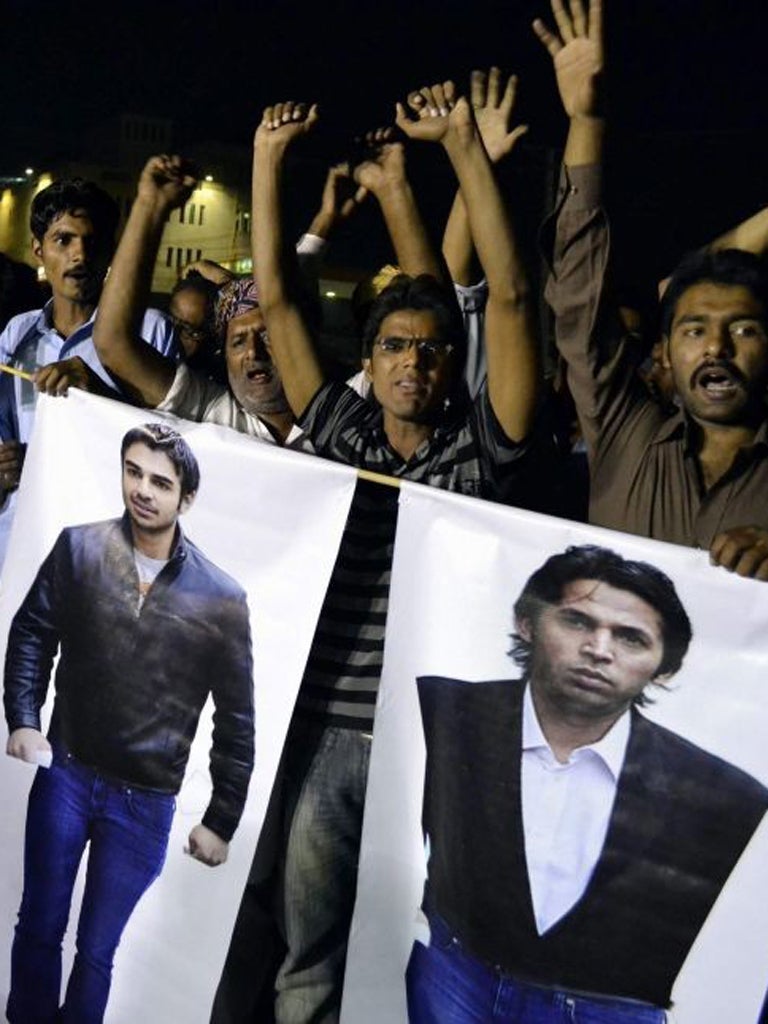Pakistan goes from crying conspiracy to burning effigies
Guilty verdicts have provoked an angry reaction from fans who had been in denial about levels of corruption says Shahid Hashmi

As the dust settles on the spot-fixing case and three Pakistani cricketers face up to time in a London prison, the focus back home has turned to the culture that created them. Can a society so blighted by corruption – and in such denial about it – ever learn the lessons that need to be learnt?
For the game's administrators, something must clearly be done. Three of their best cricketers fooled the management, violated the code of conduct and tarnished the image of a country. For the time being, surely, the current players will keep well away from any hint of malpractice. But this case will haunt Pakistani cricket for years to come – and it is easy to imagine that other young players in the future may be lured by the promise of an easy buck.
"We need to be ultra careful after this case," said the former Pakistan captain Imran Khan, now a major political leader. "These players, especially Mohammad Amir, had thought that crime pays because there are massive corruption cases against [the Pakistan] President Zardari and yet he is head of the country." And if corruption is endemic, then the power of denial is equally strong in a country where serious poverty makes such misdeeds an attractive option for some. Over the years, cricket has become a route to an easier life, and a celebrity lifestyle, for many of Pakistani cricket's brightest talents.
Pakistan's problems began when big money first came into the game in the early 1990s. It was in 1995 that three Australian players alleged that the then captain, Salim Malik, had offered them a bribe to under-perform during their tour of Pakistan. Inquiries and commissions were set up, resulting in life bans for Malik and the fast bowler Ata-ur-Rehman, while six top players – including Wasim Akram and Waqar Younis – were fined. Malik denies the charges to this day.
So when last year's sting operation by an undercover journalist shook the cricket world, many in Pakistan believed there was a conspiracy against three of their most talented players. "My initial reaction was that of shock, but after events unfolded it was understood that there was no conspiracy against them or Pakistan and no set-up," said former captain Ramiz Raja, now a commentator.
"The evidence was watertight enough for an independent sports tribunal and a criminal investigation to act upon. They did wrong and they must now pay their dues. There should be no escaping from that truth, as done in the past when we made some of the accused players our heroes.
"It's difficult to know the pulse of the people in Pakistan," Raja added. "Initially we were making them heroes. I think for [there to be] introspection rather than visualising them [as] fallen heroes or think that it is a conspiracy against Pakistan, you have to bite the bullet and look at ourselves and say that we have got to address these problems."
Raja's view appears to reflect Pakistani public opinion. Once the jury found the three players guilty, opinions started to change: even if it was a conspiracy, the players had fallen into it. People started to burn effigies and called for more action by the government. "They have tainted this country's image and once they return, they should be jailed for life," said Ali Khan, a passionate cricket fan. "We have lost faith in our cricket and it's time we cleaned up our game."
Waqar, coach of the team when the scandal broke out, called it an "ugly episode". "It was really the ugly side of the game loved by millions," he said. "Pakistan cricket needs to move on from here – so in a way it was good for Pakistan cricket, a harsh wake-up call."
For all the shame this sad episode has brought on Pakistan, it is unlikely to hurt the game here in the long term. In a country where people quickly forget politicians' misdemeanours, the next big win will bring the fans flocking back to cricket.
Shahid Hashmi is the Pakistan cricket correspondent for AFP
Subscribe to Independent Premium to bookmark this article
Want to bookmark your favourite articles and stories to read or reference later? Start your Independent Premium subscription today.

Join our commenting forum
Join thought-provoking conversations, follow other Independent readers and see their replies